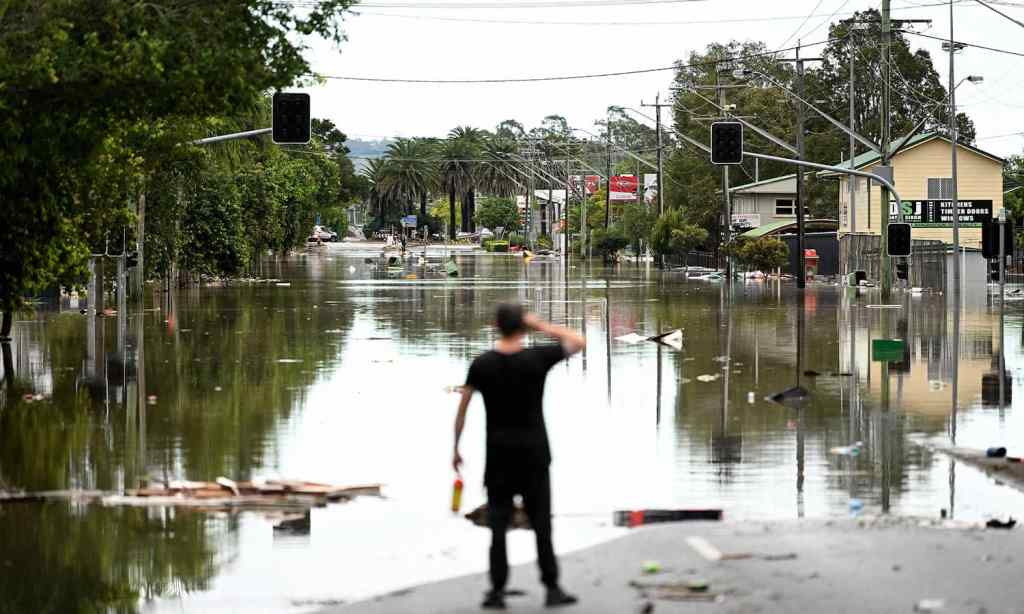People in New South Wales who have been hit by either or both of the “one in 100-year” floods that have decimated communities in the Northern Rivers region will now be eligible for disaster relief payments of up to $20,000 — but there’s a catch.
The funding boost was announced by Premier Dominic Perrottet on his first day back from paternity leave and during his third trip to the epicentre of the destruction in the town of Lismore.
The newly launched scheme — which will become live in the next few weeks — is known as the Back Home Grant and represents a $112 million commitment by the state to get residents back into safe, livable housing. This is separate from the grants already available to affected residents.
Those who have already claimed a Disaster Relief Grant are not eligible, with residents online furious about the restrictions.
#lismorefloods2022 federal gov grants are inaccessible, 5 weeks on only a few have received promised funds, now if you previously applied for disaster relief you are now not eligible to apply for promised funds from @Dom_Perrottet #auspol do better @KevinHoganMP #LNPMassiveFail
— Ticus (@RiffRaffRising) April 3, 2022
The initial disaster relief grants are a bucket in a lake, essentially….and prevent REAL financial help for those who really need it. Thanks for next to nothing @Dom_Perrottet pic.twitter.com/cQdO8NASCS
— Daisy88 (@Little_Daisy_OD) April 4, 2022
The new payments come some five weeks after the Disaster Relief Grants were authorised for residents in the area — with many having already claimed the limited support on offer. However, Resilience NSW has yet to confirm whether a single payment has been approved, and locals are outraged about the inaction being taken.
Uninsured renters, homeowners, and landlords in the Hawkesbury, Ballina, Byron, Clarence Valley, Kyogle, Lismore. Richmond Valley, and Tweed local government areas are eligible for the new payments.
Funds can be put towards things like the safe reconnection of utilities, the replacement of “essential” household items like fridges, washing machines and ovens, as well as the replacement of other household contents. The money can also be used for essential repairs by landlords and homeowners as well as to fund the cost of moving to a new place if needed.
Perrottet said the grants would help many residents with damaged dwellings get back to their homes sooner.
“Our overriding priority is to get people into safe housing, and we are looking at every possible avenue to do that,” he said.
“For those people who have properties or homes that can be repaired, this grant can be the cash that they need to make urgent repairs such as fixing roofs, making properties watertight, connecting back to electricity and replacing furniture and fridges.”
Deputy Premier Paul Toole said the grants would provide residents with money to address immediate needs.
“These grants will be delivered to the people who need it fast — we have lifted the red tape to ensure the money is delivered and homes can be repaired as quickly as possible,” Toole said.
At the same time, the Premier also announced the opening of submissions for an inquiry into the 2022 floods in the region.
The inquiry seeks to provide a forum for local voices to express their concerns over how the crisis has been handled as well as what can be done to prepare for future disasters.
Residents however have expressed their frustrations with the government for the way in which they handled the flood situation — in which many were left to fend for themselves and help was offered far too late.
The payments system has also been criticised for being too slow and too ineffective for those who have been cut off from essential services like electricity and the internet. It’s likely that this new payment announcement will be met with similar frustrations.
One Lismore resident has also told The Latch that an inquiry is not wanted by locals, and that the root cause of the issue, climate change, needed to be addressed now.
How to Claim the Back Home Grant
While the funding application is not yet open, the government has said that it will be live in the coming weeks. Residents can register to be notified when it does go live here.
Renters and owner-occupiers are eligible for a $5,000 payment, while landlords and homeowners are eligible for an additional $15,000 payment.
This is, of course, if you’ve not yet claimed a Disaster Relief Grant.
Properties eligible will have to be assessed as damaged, destroyed, or uninhabitable by the SES.
Owners or renters must also be uninsured or unable to make insurance claims.
Read more stories from The Latch and subscribe to our email newsletter.

